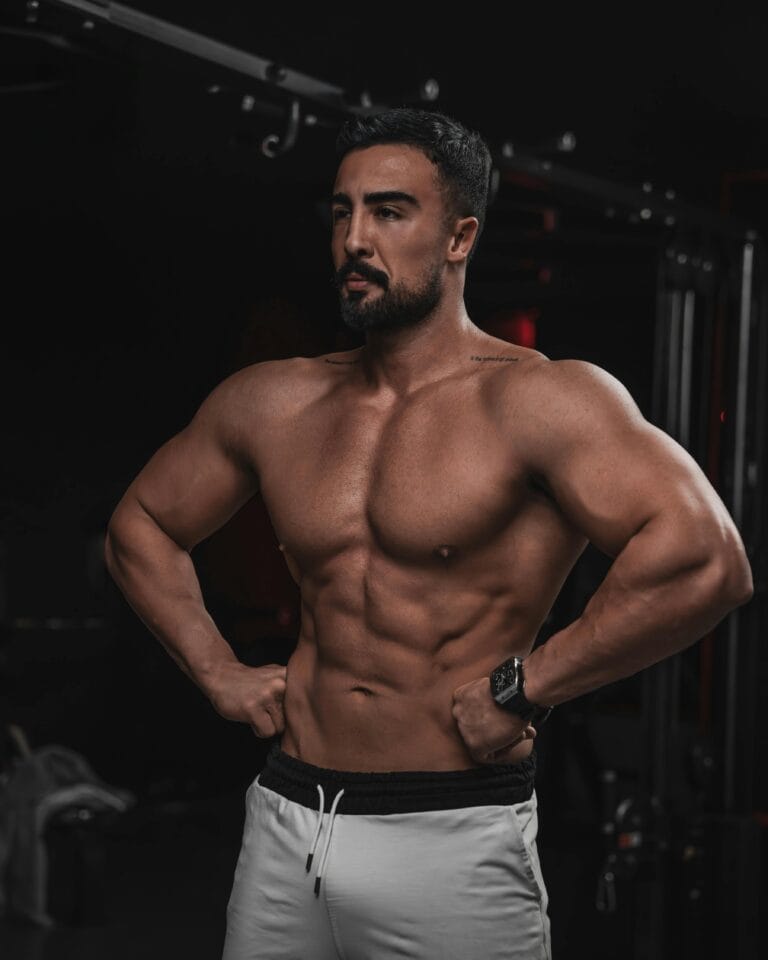FREE SHIPPING OVER $50
Eat This After a Workout—Not That: The Muscle-Building Guide Every Man Over 30 Needs

You push through that last heavy set, leave a puddle of sweat on the floor, and feel that satisfying ache of a job well done. You’ve put in the hard work—the toughest part of maximizing your training is over, right? Not quite. What you put into your body in the critical hours after a workout is arguably more important than the workout itself, especially for men over 30. If you fail to refuel correctly, you essentially tell your body to ignore the muscle-building signals you just sent it, leaving your gains stranded.
When you cross that -year milestone, your metabolism starts to shift, and your body becomes less forgiving. Recovery slows down, and the risk of age-related muscle loss, known as sarcopenia, begins to creep in. Suddenly, the sloppy post-gym habits you had in your twenties won’t cut it anymore. It’s time to move past the guesswork and adopt a muscle-building guide rooted in science. This is your definitive roadmap for post-workout nutrition: the exact foods you need to eat to trigger muscle repair and the crucial mistakes you need to avoid to maximize gains.
The Core Rule for Men Over 30: The Protein Priority
The old concept of a rigid, -minute “anabolic window” where you absolutely must slam a shake has largely been debunked. Modern sports nutrition understands that the post-workout nutrition window is much wider, often extending for several hours. However, this flexibility does not mean you can delay eating indefinitely. For men over 30 specifically, immediate, high-quality protein consumption remains a priority.
The Over ![]() Protein Mandate: Combatting Sarcopenia
Protein Mandate: Combatting Sarcopenia
Muscle Protein Synthesis (MPS), the process your body uses to build new muscle, becomes less efficient as you age. This resistance means men over 30 actually require a higher dose of protein to kickstart recovery compared to their younger counterparts.
Eat This: Aim for 30 to 40 grams of high-quality protein immediately following your training session, or at least within the first hour. This surge of amino acids overcomes the metabolic resistance and drives MPS, making your workout truly count.
Not That: Relying on small, inadequate doses of protein, such as a single scoop of powder providing only 18 grams, or skipping protein entirely in favor of a bagel. When your goal is to maximize gains, you must hit the protein threshold.
Eat This: The ![]() Macros Your Muscles are Demanding
Macros Your Muscles are Demanding
Proper post-workout nutrition is a calculated, strategic endeavor. It’s about delivering the right signals to your body to stop the breakdown of muscle tissue (catabolism) and kickstart the growth phase (anabolism). This is a two-part equation involving fast protein and strategic carbohydrates.
1. High-Quality, Rapid Protein
Protein provides the necessary amino acids, the literal building blocks for repairing and growing torn muscle fibers. The speed at which your body can access these blocks is key for initial recovery.
| Eat This (Rapid Recovery Protein) | Why It Works |
| Whey Protein Isolate: | Digests and absorbs extremely quickly, flooding the bloodstream with amino acids for immediate MPS activation. Ideal for the first |
| Whole Eggs: | A gold standard of protein quality. Eggs contain the perfect blend of protein and healthy fats, along with choline, supporting overall recovery. |
| Chicken or Tuna: | Excellent sources of lean protein for a whole-food meal an hour or two after a workout. They sustain MPS longer than a shake alone. |
2. Fast-Acting Carbohydrates: Replenish and Signal
Many men on a low-carb diet mistakenly skip carbohydrates post-workout. This is a crucial mistake that hinders muscle-building. Your primary goal after a strenuous session is to replenish glycogen (stored energy) in your muscles that you burned off. Furthermore, consuming carbs triggers an insulin spike, and insulin is a powerful anabolic hormone that helps drive protein and nutrients directly into the muscle cells.
Eat This: Aim for a or
ratio of carbohydrates to protein, depending on the intensity of your session.
| Eat This (Rapid Glycogen Carbs) | Why It Works |
| White Rice or Rice Cakes: | Simple carbohydrates with minimal fiber, which means they digest quickly and efficiently restock glycogen stores. |
| Potatoes (White or Sweet): | A whole-food source of fast-digesting starches, especially good when eaten baked or boiled. |
| Fruit (Bananas, Berries): | Provides simple sugars (glucose/fructose) and antioxidants to fight inflammation caused by training. |
3. Smart Fats: Timing is Everything
While healthy fats are vital in your diet, the post-workout window is generally not the best time for high-fat intake.
Eat This: A small amount of healthy fat is fine (such as what’s naturally present in chicken or eggs), but keep it minimal. Your priority is protein and carbs.
4. Electrolytes and Water: The Foundation of Recovery
Dehydration is the silent killer of performance and recovery. Even a small drop in hydration can dramatically impair strength and slow down the body’s ability to repair itself.
Eat This: Plain water, of course, but also consider supplementing with electrolytes. A quality electrolyte mix or coconut water helps restore the minerals (sodium, potassium) lost through sweat, ensuring that your muscles can continue to communicate and function properly for optimal recovery.
Not That: ![]() Post-Workout Mistakes That Sabotage Muscle Gains
Post-Workout Mistakes That Sabotage Muscle Gains
You can do everything right with your food choices, but a single post-workout nutrition mistake can dramatically slow down your progress and undermine your efforts in the gym. If you’re a man over 30 struggling to see progress, review these common pitfalls.
1. The High-Fat Trap: Slowing Down Absorption
While healthy fats are generally great for satiety and overall health, they are your enemy during the immediate post-workout window. Why? Fat significantly slows down the digestion rate.
Not That: Eating a double cheeseburger, a handful of almonds, or a high-fat protein bar immediately after training. When you consume a lot of fat, it delays the protein and carbohydrates from reaching your muscles on time, effectively blunting the insulin spike needed to signal anabolism. This ultimately slows down muscle-building and recovery.
2. Excessive Fiber and Undereating Carbs
Fiber is excellent for gut health, but its role is to slow digestion, which is exactly the opposite of what you want right after a grueling training session. Similarly, many men drastically under-eat carbohydrates out of fear of getting fat.
Not That: Eating a large bowl of fibrous beans, a huge whole-wheat sandwich, or a dense salad immediately after training. Additionally, severely limiting your carbohydrate intake means your muscle glycogen stores remain depleted, leaving you sluggish and preventing full recovery for your next session. You need those fast carbs to trigger recovery.
3. The Alcohol Penalty: A Recipe for Catabolism
It’s tempting to head to the pub or grab a beer after a tough workout, but alcohol is one of the most powerful muscle-building inhibitors you can consume.
Not That: Having a beer, a cocktail, or any alcoholic drink post-training. Alcohol intake has been shown to reduce MPS, impair hormone regulation, and significantly hamper recovery. It dehydrates you and actively works against your efforts to maximize gains. Save the celebratory drink for a rest day, or at least a few hours after you have successfully consumed a proper post-workout meal.
Action Plan: Creating Your Ideal Post-Workout Plate
Applying these principles to your life doesn’t need to be complicated. The goal is to create simple, transportable, and effective post-workout meals that adhere to the golden rules of high protein, fast carbs, and low fat.
![]() 1. The Immediate Shake Strategy (Ideal for the commute or gym parking lot):
1. The Immediate Shake Strategy (Ideal for the commute or gym parking lot):
The shake remains the fastest way to get your key nutrients.
- The “Eat This” Mix: 40
g Whey Isolate + 1
large banana (or a scoop of dextrose powder) + water or coconut water.
- Targeted Ratio: This mix provides the essential 30
to 40
g protein and fast-acting carbs to jumpstart recovery.
![]() 2. The Whole-Food Recovery Meal (Ideal
2. The Whole-Food Recovery Meal (Ideal ![]() 1-2 hours post-training):
1-2 hours post-training):
Once you are home and showered, sit down for a real meal that supports long-term muscle-building.
- The “Eat This” Meal:
6 ounces of grilled chicken breast or fish (tuna/cod) + 1.5
cups of white rice or baked potatoes (peeled is fine for faster digestion) + a small serving of steamed vegetables (for micronutrients).
- The “Not That” Swap: Avoid adding excessive amounts of cheese, butter, or heavy oils to this meal. Keep the focus on the lean protein and simple starch.
![]() 3. The Nighttime Insurance (Pre-sleep for better recovery):
3. The Nighttime Insurance (Pre-sleep for better recovery):
For men over 30, optimizing overnight recovery is essential for maximizing training.
- The “Eat This” Insurance: A small bowl of plain, Greek yogurt (full-fat is fine here as digestion is slow anyway) or a casein protein shake.
- Why It Works: Casein digests slowly, providing a steady stream of amino acids throughout the night to prevent catabolism, which is the breakdown of muscle tissue while you sleep.
Related Articles
- Ultra-Processed—but Healthy? These 8 Foods Break All the Rules
- Testosterone Tanking After 30? These 10 Foods Could Be Your Hormonal Lifeline
- This Everyday Root Could Lower Your Blood Pressure Naturally—Doctors Are Talking About It
- Men Over 50: Eat These 10 Protein-Packed Foods Daily to Stay Strong, Lean, and Energized
- The Protein Myth: 10 Plant Foods That Build More Muscle Than Meat—Sports Nutritionists Say You’ve Been Lied To







